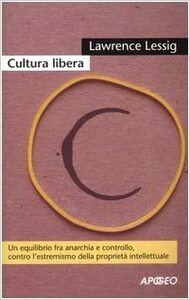Take a photo of a barcode or cover
I had the amazing opportunity to read the Afterword of the AudioBook version of "Free Culture" back in the mid-2000s.
This is an important book that anyone who is interested in copyright and the inherent flaws within the system should read.
https://archive.org/details/free-culture-audiobook
This is an important book that anyone who is interested in copyright and the inherent flaws within the system should read.
https://archive.org/details/free-culture-audiobook
informative
inspiring
Great elements of historical context, current issues and due to it's age a flashback to the days of napster.
Excellent overview of the history of American copyright. Maddening at times when you see how far away we've gotten from the original idea and how it's all in the name of greed and throttling the competition. I agree with Lessig: a copyright renewal policy where it's up to the copyright owners to decide if/when to put their works into public domain would be preferable. As an author, this book gave me a lot to think about! In any case, a very interesting read.
I read this book through Dailylit.com, and it was fairly well suited to the instalment format. Came across as a series of small essays, instead of a continuous thought.
Lessig was a decently pleasant narrator, although he relied a little too heavily on case studies and analogies for my preferences. I'd prefer broader descriptions of ideas and ideals, followed by case studies instead of introduced by them.
Near the end was a paragraph which crystallized my understanding of why I think the free culture movement might be a better idea than not. Creative and scientific works are an attempt at describing realities, even imaginary realities, and through utilizing, modifying, and expanding upon these things, reality is better and more richly defined, understood, and puzzled at. While this certainly isn't a sufficient argument, it is, to me, a compelling one.
Lessig was a decently pleasant narrator, although he relied a little too heavily on case studies and analogies for my preferences. I'd prefer broader descriptions of ideas and ideals, followed by case studies instead of introduced by them.
Near the end was a paragraph which crystallized my understanding of why I think the free culture movement might be a better idea than not. Creative and scientific works are an attempt at describing realities, even imaginary realities, and through utilizing, modifying, and expanding upon these things, reality is better and more richly defined, understood, and puzzled at. While this certainly isn't a sufficient argument, it is, to me, a compelling one.
Even though it took me forever to read, this book is awesomely important, clearly written, and enjoyable (when it's not terrifying, considering the consequences Lessig lays out).
informative
slow-paced
Very rare to find a book about intellectual property that actually applies common sense.
Essentially, the genuinely free culture should be the one we make.
Such a well-argued case for fair use and the need for new definitions of copyright.





